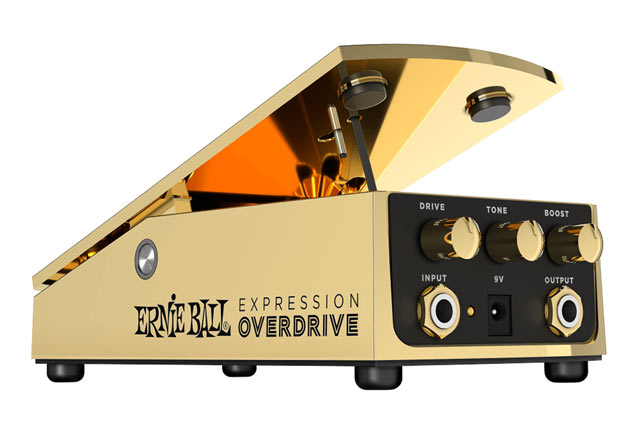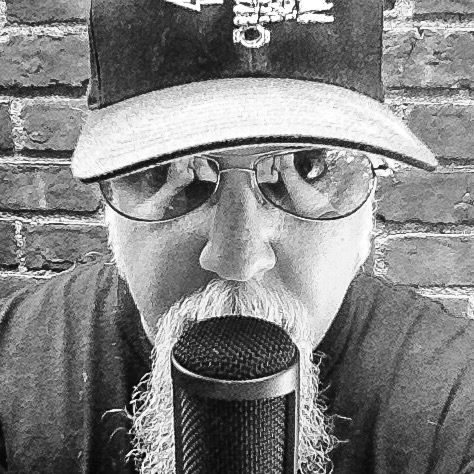Review: Ernie Ball Expression Overdrive and Ambient Delay

PLATINUM AWARD
The expression pedal is a woefully underused tool in the effects market.
Sure, we’ve had our wah pedals for a good long run, and the Whammy pedal proved that pitch shifting and an expression pedal made a really cool pair, but beyond that the expression pedal is mostly offered only as a costly alternative option for more adventurous sonic explorers on a handful of products in the stomp box realm.
With the introduction of their new Expression Overdrive and Ambient Delay effect pedals, Ernie Ball is boldly proclaiming, “Why not give expression a chance?” by making the expression pedal an integrated feature of their stomp box designs.
FEATURES
The Ernie Ball Expression Overdrive and Ambient Delay would both be impressive overdrive and reverb/delay effects even if they were housed in the usual square box with a footswitch format, but the additional of built-in expression pedal control elevates these pedals to a new level.
Both are housed in solidly crafted metal enclosures with gold (Expression Overdrive) and rose gold (Ambient Delay) plating. Both pedals are powered by a nine-volt adapter (not included), or you can use your own standard center-negative barrel plug power source. The pedals have a textured non-slip pad on the top of the foot treadle, and the control knobs and mono 1/4-inch input and output jacks are all located on the pedal’s front-facing surface.
The Expression Overdrive’s controls consist of Drive, Tone (a treble roll-off function) and Boost (providing up to 6dB of boost). The Ambient Delay’s controls consist of Reverb (the level of a plate reverb effect), Feedback (number of repeats from one to many) and Time (from 50ms to one second). The Ambient Delay also features a 1/4-inch jack for connecting an optional on/off footswitch for controlling a tap tempo function. On the delay, the expression pedal controls the mix between the wet and dry settings, functioning sort of as an on/off switch but with the ability to also mix in how much of the effect that is desired.
Get The Pick Newsletter
All the latest guitar news, interviews, lessons, reviews, deals and more, direct to your inbox!
PERFORMANCE
Even without the expression pedal feature, the Expression Overdrive and Ambient Delay would be worth the price of admission as both are solid, useful tools with the kind of overdrive and delay/reverb effects that players rely upon as building blocks for their tones rather than occasional exotic touches of “spice.”
The Expression Overdrive also stands out from most other overdrive effects in the way that the guitar’s dry signal always remains present and the overdrive textures are blended in at varying levels of intensity depending upon how far the toe is pressed down. The Ambient Delay’s expression pedal provides bone-dry effect free sound at the heel down position, and similarly it blends in an increasing level of delay and reverb simultaneously as the toe is depressed down on top of the dry signal.
Although the Expression Overdrive always includes the guitar’s “dry” tone in the mix (technically the tone isn’t dry as the pedal’s tone control setting is always active and remains constantly in the signal path), it’s not to be confused with a traditional clean boost as the “dry” tone remains consistent while the treadle pedal mixes in an additional layer of gain grit and volume boost that increase the further the player depresses his or her toe.
The Ambient Delay’s heel down “bypass” setting matches the sound of plugging the guitar straight into the amp. I would have liked the option to control different parameters with the expression pedal, but most players will be perfectly content with the usefulness of the bypass/effect mix sweep function of both products.
LIST PRICE: $203.99 (each)
MANUFACTURER: Ernie Ball, ernieball.com
• Both pedals feature built-in expression pedals that do away with the standard click switch and enable users to blend effect levels from dry to fully processed.
• The Expression Overdrive provides up to 6dB of boost, while the Ambient Delay combines delay (up to one second) and plate reverb.
THE BOTTOM LINE
After using the Expression Overdrive and Ambient Delay and experiencing their expressive potential, you’ll never want to go back to the click of a footswitch again.
Chris is the co-author of Eruption - Conversations with Eddie Van Halen. He is a 40-year music industry veteran who started at Boardwalk Entertainment (Joan Jett, Night Ranger) and Roland US before becoming a guitar journalist in 1991. He has interviewed more than 600 artists, written more than 1,400 product reviews and contributed to Jeff Beck’s Beck 01: Hot Rods and Rock & Roll and Eric Clapton’s Six String Stories.
“The original Jordan Boss Tone was probably used by four out of five garage bands in the late ’60s”: Unpacking the gnarly magic of the Jordan Boss Tone – an actual guitar plug-in that delivers Dan Auerbach-approved fuzz
“This is a powerhouse of a stompbox that manages to keep things simple while offering endless inspiration”: Strymon EC-1 Single Head dTape Echo pedal review










